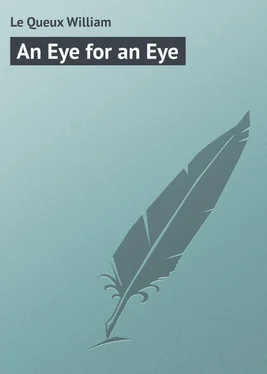William Le Queux - An Eye for an Eye
Здесь есть возможность читать онлайн «William Le Queux - An Eye for an Eye» — ознакомительный отрывок электронной книги совершенно бесплатно, а после прочтения отрывка купить полную версию. В некоторых случаях можно слушать аудио, скачать через торрент в формате fb2 и присутствует краткое содержание. Жанр: foreign_prose, на английском языке. Описание произведения, (предисловие) а так же отзывы посетителей доступны на портале библиотеки ЛибКат.
- Название:An Eye for an Eye
- Автор:
- Жанр:
- Год:неизвестен
- ISBN:нет данных
- Рейтинг книги:3 / 5. Голосов: 1
-
Избранное:Добавить в избранное
- Отзывы:
-
Ваша оценка:
- 60
- 1
- 2
- 3
- 4
- 5
An Eye for an Eye: краткое содержание, описание и аннотация
Предлагаем к чтению аннотацию, описание, краткое содержание или предисловие (зависит от того, что написал сам автор книги «An Eye for an Eye»). Если вы не нашли необходимую информацию о книге — напишите в комментариях, мы постараемся отыскать её.
An Eye for an Eye — читать онлайн ознакомительный отрывок
Ниже представлен текст книги, разбитый по страницам. Система сохранения места последней прочитанной страницы, позволяет с удобством читать онлайн бесплатно книгу «An Eye for an Eye», без необходимости каждый раз заново искать на чём Вы остановились. Поставьте закладку, и сможете в любой момент перейти на страницу, на которой закончили чтение.
Интервал:
Закладка:
The mystery was certainly one of the strangest that had ever puzzled the crime investigators of London. The cause of its discovery was a most remarkable incident, and at every turn as the investigation proceeded mystery seemed to follow upon mystery, until the whole affair presented so many curious features that a solution of the problem seemed utterly impossible.
I bent beside the body of the woman who, reclining in the armchair with one arm fallen by her side, presented the appearance of one asleep. Her presence there was a profound enigma. A thought, however, occurred to me at that moment. The dining-table below had been laid for three. Perhaps she was the third person.
For the greater part of an hour we remained in that house of grim shadows discussing the various phases of the astounding affair, until at last, about eleven, we all left, two constables in uniform being stationed within. So secretly had this search been carried out that the neighbours, though, perhaps, puzzled by Patterson’s inquiries, entertained no suspicion of any tragic occurrence. In Kensington Road all the shops facing Upper Phillimore Place were closed save the tobacconist’s and the frequent public-houses, the foot passengers were few, and at that hour the stream of taxis with homeward-bound theatre-goers had not yet commenced. Market garden carts from Hounslow or Feltham, piled high with vegetables, rumbled slowly past on their journey to Covent Garden, and a few empty motor-buses rattled along towards Hyde Park, but beyond all was quiet, for that great artery of Western London goes early to rest.
At the police-station we took leave of Patterson and Boyd, and entering a motor-bus at Kensington Church, arrived at our chambers shortly before midnight.
“There’s something infernally uncanny in the whole business,” said the Mystery-monger as we sat smoking, prior to turning in. It was our habit to smoke and gossip for half an hour before going to bed, no matter what the time. Our talk was generally of “shop” events in our world of journalism, the chatter of Fleet Street intermingled with reminiscences of the day’s doings. Dick was sitting in the armchair reflectively sucking his eternal briar, while I sat at my table pondering over a letter I had found there on my return. It was from Mary Blain, for whom I had once long ago entertained a very strong affection, but who had since gone out of my life, leaving only a shadowy recollection of a midsummer madness, of clandestine meetings, of idle, careless days spent in company with a smart, eminently pretty, girl in blue serge skirt, cotton blouse and sailor hat. All was of the past. She had played me false. I was poor, and she had thrown me over for a man richer than myself. For nearly three years I had heard little of her; indeed, I confess that she had almost passed from my memory until that evening when I had sat awaiting Dick, and now on my return I opened that letter to discover it in her well-known, bold hand – the hand of an educated woman.
The letter, which had had some wanderings, as its envelope showed, and was dated from her father’s house up the river, merely expressed a hope that I was in good health, and satisfaction at hearing news of me through a mutual friend. Such a letter struck me as rather strange. I could only account for it by the fact that she desired to resume our acquaintanceship, and that this was a woman’s diplomatic way of opening negotiations. All women are born diplomatists, and woman’s wit and powers of perception are far more acute than man’s.
The letter brought back to me vividly the memory of that sweet, merry face beneath the sailor hat, the wealth of dark hair, the laughing eyes so dark and brilliant, the small white hands, and their wrists confined by their golden bangles. Yes, Mary Blain was uncommonly good-looking. Her face was one in ten thousand. But she was utterly heartless. I recollected how, when with her mother she had spent a summer at Eastbourne, what a sensation her remarkable beauty caused at Sunday parade on the Esplanade. She was lovely without consciousness of it, utterly ingenuous, and as ignorant of the world’s wickedness as a child. The daughter of a wealthy City man who combined company-promoting with wine-importing, she had from childhood been nursed in the lap of luxury, and being the only child, was the idol of her parents. Their country house at Harwell, near Didcot, was in my father’s parish, and from the time when her nurse used to bring her to the Rectory until that well-remembered evening when in the leafy by-lane I had for the last time turned my back upon her with a hasty word of denunciation, we had been closest friends. She had played me false. My hopes had been wrecked on Life’s strange and trackless sea, and now whenever I thought of her it was only in bitterness. I have more than a suspicion that old Mr Blain did not approve of our close acquaintanceship, knowing that I was a mere journalist with an almost untaxable income; nevertheless, she had continued to meet me, and many were the happy hours we spent together wandering through that charming country that skirts the upper reaches of the Thames.
In order to see her I used frequently to run down from London to my home on Saturdays and remain till Mondays. With her mother she sat in her seat in front of the Rectory pew, and as she walked down the aisle her face would be illumined by a glad light of welcome. How restful were those Sundays after the wear and tear of London life! How peaceful the days in that sleepy little village hidden away in a leafy hollow three miles from the Great Western line! After we had parted, however, I did not go home for six months. Then, on inquiry, I found that the Blains had sold their place, presumably because they were in want of money, for it was said that they had taken a smaller house facing the Thames, near Laleham, that village a little beyond Shepperton, where in the churchyard lies Matthew Arnold. From all accounts old Blain had lost heavily in speculation and had been compelled to sell his carriages and horses, dispose of many of his pictures, and even part with some of the Louis Seize furniture at Shenley Court, where they had lived. This was, of course, indicative of a very severe reverse of fortune.
Since those hours of Mary’s love and her subsequent falseness, my life had been a queer series of ups and downs, as it must ever be in journalistic London. Many dreary days of changeful care had come and gone since then.
I sat silent, thinking, with her letter still open in my hand.
“Why are you so confoundedly glum, old man?” Dick asked. “What’s your screed about? Duns in the offing?”
“No. It’s nothing,” I answered evasively, smiling.
“Then don’t look so down in the mouth,” he urged. “Have a peg, and pull yourself together.” He had been in India, and consequently termed a whisky-and-soda a “peg.” The origin of that expression is a little abstruse, but is supposed to refer pointedly to the pegs in one’s coffin.
I thrust the letter into my pocket, helped myself to a drink, and lit a cigarette.
“It’s a really first-class sensation,” Dick said, again referring to the curious affair. “Pity I can’t publish something of it to-morrow. It’s a good thing chucked away.”
“Yes,” I replied. “But Patterson has some object in imposing secrecy on us.”
“Of course,” he answered thoughtfully.
There was a pause. We both smoked on. Not a sound penetrated there save the solemn ticking of the clock and the distant strains of a piano in some man’s rooms across the square.
“Do you know, Frank,” my companion said after some reflection, and looking at me with a rather curious expression – “do you know that I have some strange misgivings?”
“Misgivings!” I echoed. “Of what?”
Читать дальшеИнтервал:
Закладка:
Похожие книги на «An Eye for an Eye»
Представляем Вашему вниманию похожие книги на «An Eye for an Eye» списком для выбора. Мы отобрали схожую по названию и смыслу литературу в надежде предоставить читателям больше вариантов отыскать новые, интересные, ещё непрочитанные произведения.
Обсуждение, отзывы о книге «An Eye for an Eye» и просто собственные мнения читателей. Оставьте ваши комментарии, напишите, что Вы думаете о произведении, его смысле или главных героях. Укажите что конкретно понравилось, а что нет, и почему Вы так считаете.












